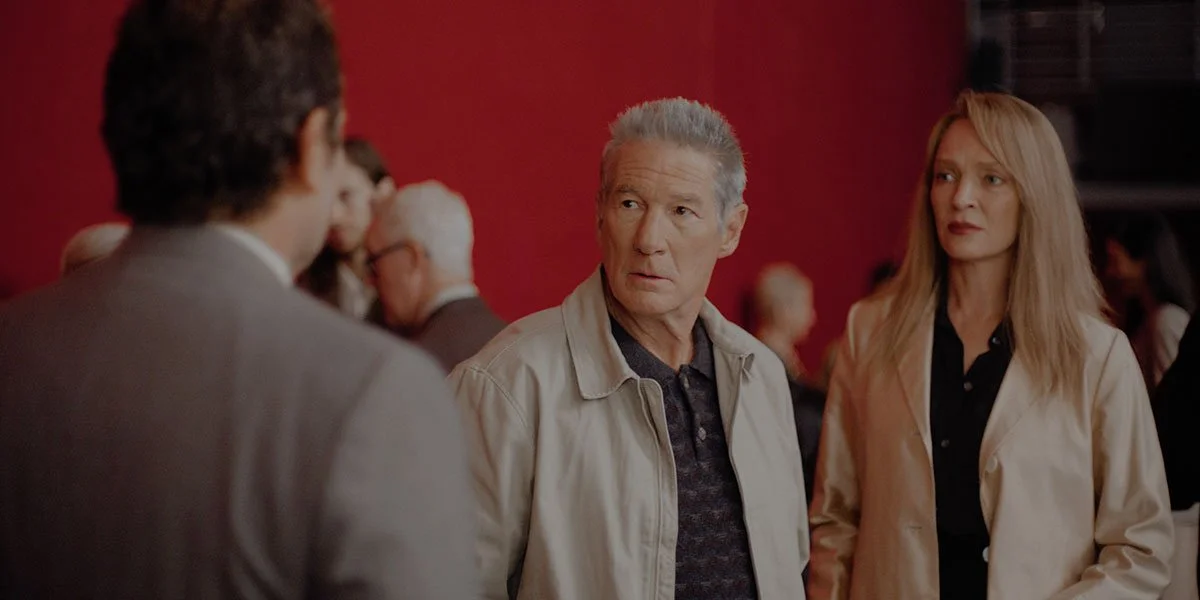TIFF24: Oh, Canada
Paul Schrader’s Oh, Canada is for real Schrader heads only. The film was born out of Schrader’s own health issues in recents years and spurred into production when Russell Banks, who wrote the novel Foregone upon which the movie is based, died in 2023. The movie is a tale obsessed with death as well as a retrospective look at life that uses the camera as a means of revealing the truth that we refuse to admit to ourselves.
Oh, Canada is also clearly a movie made by an auteur operating in “late style,” meaning that it has all the thematic hallmarks of the auteur’s earlier work, but is rougher around the edges when it comes to tone and style (Michael Mann’s Ferrari and Clint Eastwood’s 15:17 to Paris are examples). The movie is ambitious, while also somewhat ambivalent about being comprehensible to the average viewer. It concerns Leonard Fife, who is played by Richard Gere in the present and Jacob Elordi in flashbacks. Fife is a respected documentary filmmaker living in Canada. Now on his deathbed, Fife invites his former students (Michael Imperioli and Penelope Mitchell) to interview him about his life and the reason he fled to Canada from the United States in the early 1970s. The interview becomes a kind of confessional and the camera lens the confessional box. Oh, Canada might not be as explicitly religious as many of Schrader’s other films, but it’s still clearly a religious film, obsessed with the notion of last rites and sin and the possibility of redemption at the end of a life full of regrets.
Aspects of Schrader’s approach are riveting. Casting Gere in the lead allows Schrader to call back to his earlier works, namely American Gigolo (1980), which put Gere on the map, but Schrader also lets Gere operate outside of the romantic lead/Zen elder statesman role that he’s mostly performed over the past decade or two. Gere’s Fife is prickly and bitter. He’s not asked to be romantic or charismatic; that’s for Jacob Elordi in the flashback scenes. Rather, Gere’s Fife is a guilt ridden man who emphatically wants to set the record straight, even if his memory and his own recollection of events aren’t entirely true. Key to Fife’s guilt is his fleeing his home and abandoning his family when he left for Canada, ostensibly to avoid the draft for Vietnam. Schrader himself famously fled his Calvinist family in Michigan to take up filmmaking in Los Angeles. It’s not hard to see Fire as an avatar for Schrader himself, as if Schrader is musing about his own choices and potential choices in life through Fife’s own late life ruminations.
The film is structured around Fife’s interview. In a dark room, Fife speaks into the camera about his life, particularly the years around his emigration to Canada and his rise to prominence as a documentary filmmaker. We then watch this past with Jacob Elordi in the role of the younger Fife and Gere narrating overtop. Sometimes, these scenes are filmed in a soft, grainy style reminiscent of 16mm with earthy tones. Other times, we get black and white. Elordi is typically in the role, but often, Gere will replace him mid scene. Schrader tries to discombobulate us and provide a poetic vision of the past. He also wants to make clear that Fife is an unreliable narrator, wracked by cancer, painkillers, and guilt. The documentary camera is meant to force Fife to reveal his true self, much as he’s used the camera to expose others in his documentary work, but the camera, after all, is not truly objective. In a sense, what we see is true or at least true to Fife in the moment he tells it, but is it real? Such is the case with cinema itself. Schrader has revealed himself to us over the years through his films, but what he’s revealed has never been facts, but rather a Herzogian “ecstatic truth.” The narrative of Oh, Canada progresses with an elliptical structure that returns to key points again and again, aspiring for a poetic effect, often clumsily. But it also stumbles into genuine beauty at moments, too.
After Schrader’s recent, brilliant trifecta of First Reformed (2017), The Card Counter (2021), and Master Gardener (2022), this film is surely something of a letdown. But it also shares those films’ boldness and authenticity. Like the title, the film is frequently ironic, but never in a cynical way. It’s Schrader speaking from the heart as an old, sentimental, self-loathing man. In the end, Oh, Canada seems essential to the Paul Schrader story and his cinematic canon, but not essential as a movie in itself. In a sense that Leonard Fife would likely admire, Oh, Canada embodies its contradictions.
6 out of 10
Oh, Canada (2024, USA)
Directed by Paul Schrader; written by Paul Schrader, based on Foregone by Russell Banks; starring Richard Gere, Jacob Elordi, Uma Thurman, Victoria Hill, Michael Imperioli, Penelope Mitchell, Kristine Froseth, Zach Shaffer.
Related Posts
